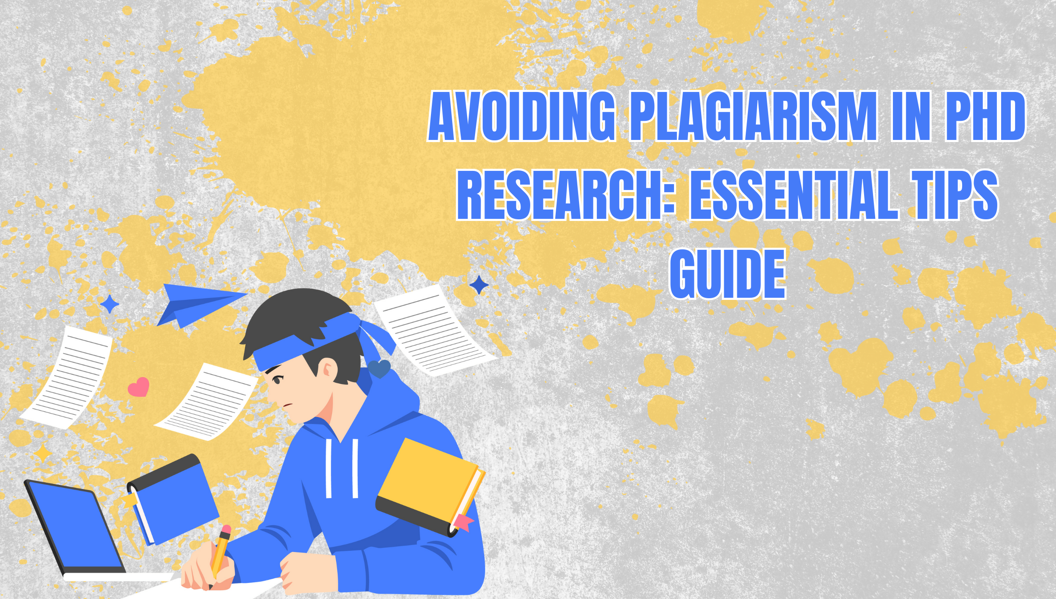Avoiding Plagiarism in PhD Research: Essential Tips Guide
Kenfra Research - Shallo2025-05-05T14:40:49+05:30Plagiarism in academic research is not just an ethical lapse—it’s a serious offense that can derail your entire PhD journey. Whether intentional or accidental, plagiarism can lead to rejected theses, revoked degrees, and damaged reputations. As a PhD scholar, your work is expected to demonstrate originality, critical thinking, and a deep understanding of your subject. That’s why avoiding plagiarism in PhD research is non-negotiable. In this blog, we’ll walk you through everything you need to know about avoiding plagiarism in PhD research—what it is, why it matters, and most importantly, how to avoid it using practical tips and tools.

What Is Plagiarism in PhD Research?
Plagiarism is the act of using someone else’s ideas, words, or work without proper acknowledgment. In the context of PhD research, this includes:
- Copying and pasting content from books, articles, or websites without citation
- Paraphrasing ideas without giving credit to the original author
- Submitting someone else’s work as your own
- Improper citation or failure to use quotation marks
- Self-plagiarism: reusing your previously published work without disclosure
Plagiarism can be deliberate or unintentional, but the consequences are severe either way.
Why Is Avoiding Plagiarism So Important?
Universities and research institutions take academic integrity very seriously. Here’s why avoiding plagiarism is crucial:
- Academic Integrity: Upholds your credibility as a researcher
- Degree Approval: Many theses are rejected due to high similarity scores
- Publication Success: Journals use plagiarism detectors to screen submissions
- Legal & Ethical Issues: Infringing copyright can lead to lawsuits and blacklisting
By avoiding plagiarism, you not only protect your academic career but also contribute to the integrity of the scientific community.
10 Essential Tips to Avoid Plagiarism in Your PhD Thesis
Here’s a practical list of strategies you can follow to ensure your thesis remains original and plagiarism-free.
- Understand What Constitutes Plagiarism
Start by educating yourself about different types of plagiarism—direct, mosaic, paraphrasing without citation, and self-plagiarism. Knowing what counts as unethical writing will help you steer clear of it.
- Use Proper Citations and Referencing Styles
Always give credit where it’s due. Follow your university’s preferred referencing style—APA, MLA, Chicago, IEEE, or Harvard. Be consistent and precise with:
- In-text citations
- Reference lists
- Bibliographies
- Footnotes and endnotes
- Paraphrase Carefully and Ethically
Paraphrasing doesn’t mean just changing a few words. It requires rewriting the idea entirely in your own words and still citing the source. Use tools like Grammarly or QuillBot with caution, and always double-check your final output for accuracy.
4. Maintain a Research Journal or Source Log
Keep a well-organized log of all the sources you read. Include full bibliographic details, page numbers, and notes. This helps in proper attribution later and avoids the mistake of using uncited content.
- Use Plagiarism Detection Software
Before submitting your thesis, run your document through trusted plagiarism checkers. Some popular options include:
- Turnitin – Widely used in universities
- iThenticate – Preferred by academic publishers
- Grammarly Premium – Offers similarity detection
- Plagscan or Quetext – For quick self-checks
Make sure the tool compares your content with academic databases, not just websites.
- Avoid Copy-Pasting Content, Even from Your Own Work
Copy-pasting content from your previous assignments or published articles without proper disclosure counts as self-plagiarism. Instead, refer to it and cite it appropriately or rephrase and present it with fresh analysis.
7. Use Direct Quotes Sparingly
When quoting directly, use quotation marks and cite the source. However, avoid overusing quotes—your thesis should reflect your voice and analysis, not just a collection of others’ thoughts.
- Seek Permission for Reuse (If Necessary)
If you need to reuse charts, tables, or figures from published papers, obtain written permission from the publisher and provide the appropriate credit.
- Get Expert Help for Thesis Proofreading
Before final submission, ask a research mentor, supervisor, or professional editor to review your work. An external perspective helps identify overlooked citations or accidental paraphrasing errors.
- Understand Your University’s Plagiarism Policy
Each academic institution has specific guidelines on plagiarism thresholds and consequences. Familiarize yourself with your university’s code of conduct and follow the submission protocols strictly.
Bonus Tip: Develop Your Own Research Voice
The best way to avoid plagiarism is to develop confidence in your academic writing. Here’s how:
- Think Critically: Analyze rather than copy others’ perspectives
- Take Notes in Your Own Words: Summarize instead of transcribing
- Practice Writing Regularly: The more you write, the more original your voice becomes
- Attend Academic Writing Workshops: These improve both style and ethics
Originality is not just about avoiding copy-paste—it’s about making a unique contribution to your field.
Best Tools to Help You Avoid Plagiarism
Here’s a quick list of tools every PhD researcher should have in their writing arsenal:
Tool | Purpose | Notes |
Zotero / Mendeley | Reference management | Automate citations and bibliography |
Turnitin / iThenticate | Plagiarism checking | Compare with academic and web sources |
Grammarly Premium | Writing & plagiarism check | Checks grammar + offers similarity reports |
Paraphraser.io / Quillbot | Ethical paraphrasing | Use carefully with proper manual editing |
Google Scholar | Source verification | Find original research sources |
Final Thoughts
Avoiding plagiarism in PhD research is not just about avoiding penalties—it’s about respecting intellectual property, maintaining credibility, and building a career on originality. With the right habits, tools, and awareness, avoiding plagiarism in PhD becomes a natural part of your academic process, ensuring that your thesis stands out for its merit, not for misconduct. Whether you’re just beginning your doctoral journey or polishing your final draft, always keep in mind: integrity in research is the cornerstone of academic success.
Kenfra Research understands the challenges faced by PhD scholars and offers tailored solutions to support your academic goals. From topic selection to advanced plagiarism checking.









Leave a Reply